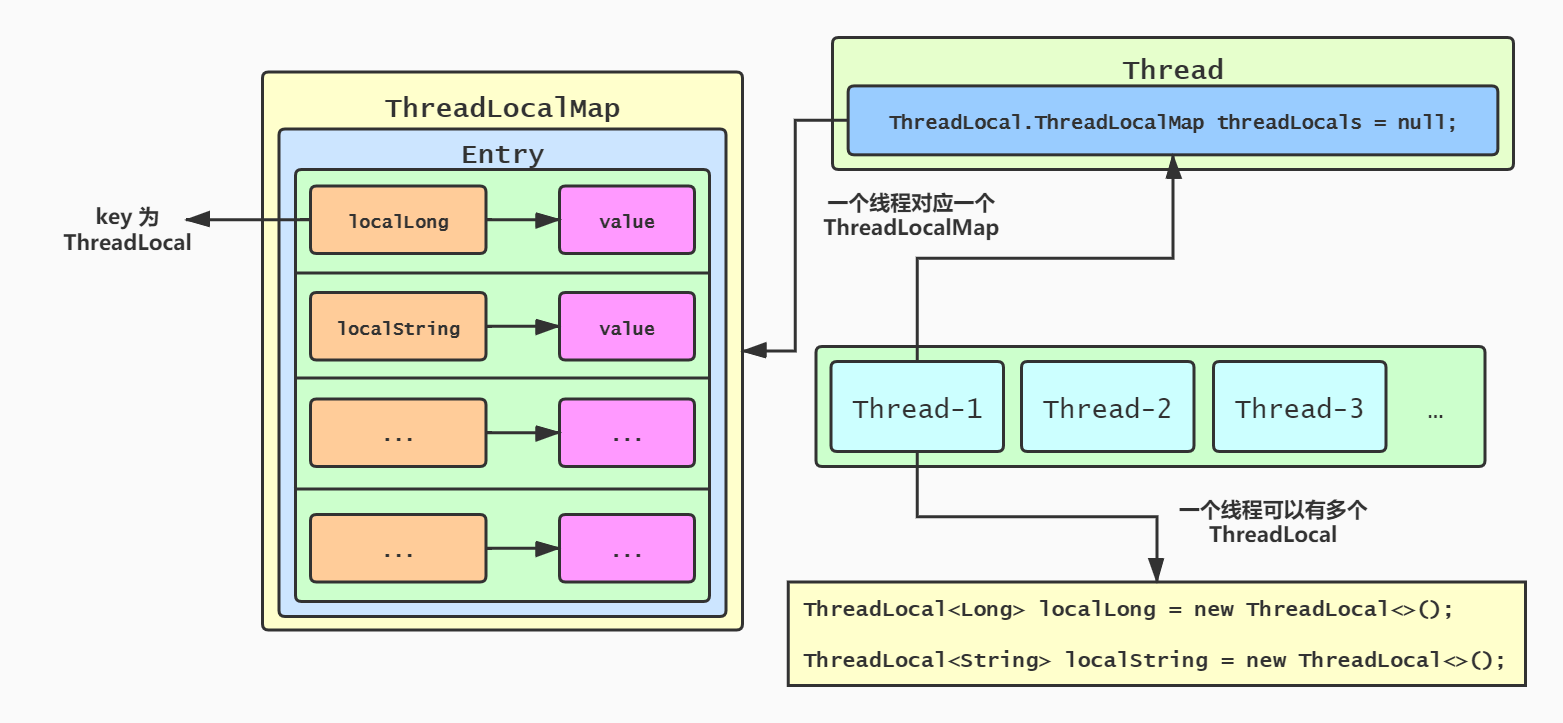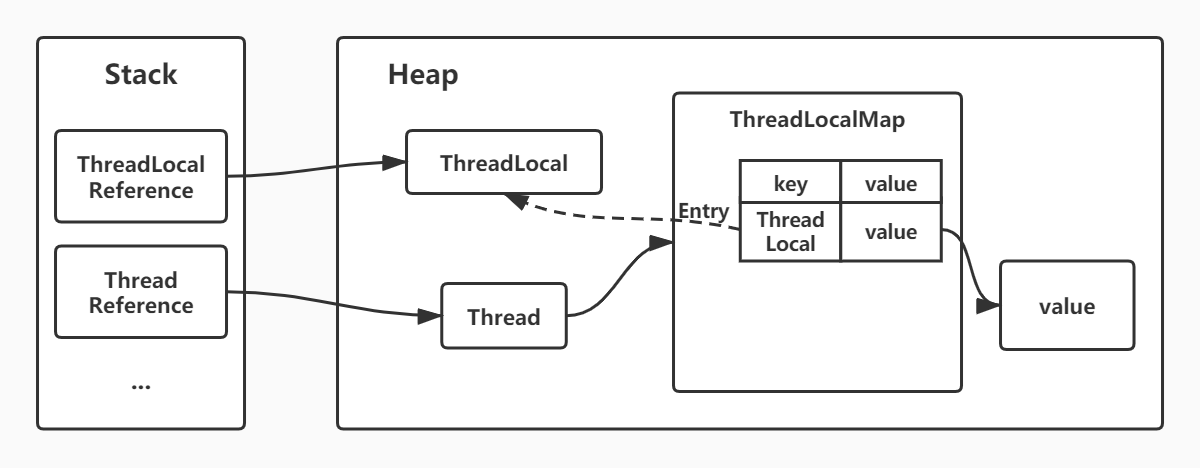ThreadLocal源码阅读
- ThreadLocal 提供了线程独有的局部变量,每个线程都可以通过
set和get来修改或获取且不会和其它线程的操作产生冲突,实现线程间的数据隔离。
ThreadLocal原理

- ThreadLocalMap 为 ThreadLocal 的静态内部类
- ThreadLocalMap 内部定义了一个 Entry 类作为存放局部变量的结构,其中
key为 ThreadLocal 对象,value为局部变量的值 - ThreadLocalMap 用 Entry[] table 存放多个 ThreadLocal,通过
key的哈希值和数组长度计算存放位置;哈希冲突采用开放定址法 - Entry 类继承了 WeakReference,其
key值为弱引用,可以避免内存泄漏问题。 - Thread 类内部维护了一个 ThreadLocal.ThreadLocalMap 成员变量,即每个线程都对应一个 ThreadLocalMap,故使用 ThreadLocal 可以保证变量为线程独有且可以有多个。
ThreadLocal 源码
- ThreadLocal 结构
public class ThreadLocal<T> {
// ...
static class ThreadLocalMap {
static class Entry extends WeakReference<ThreadLocal<?>> {
/** The value associated with this ThreadLocal. */
Object value;
Entry(ThreadLocal<?> k, Object v) {
// key值为弱引用
super(k);
value = v;
}
}
}
// ...
}
- ThreadLocalMap 解决哈希冲突
private void set(ThreadLocal<?> key, Object value) {
// We don't use a fast path as with get() because it is at
// least as common to use set() to create new entries as
// it is to replace existing ones, in which case, a fast
// path would fail more often than not.
Entry[] tab = table;
int len = tab.length;
int i = key.threadLocalHashCode & (len-1);
// 开放定址法解决哈希冲突
for (Entry e = tab[i];
e != null;
e = tab[i = nextIndex(i, len)]) {
ThreadLocal<?> k = e.get();
if (k == key) {
e.value = value;
return;
}
if (k == null) {
replaceStaleEntry(key, value, i);
return;
}
}
tab[i] = new Entry(key, value);
int sz = ++size;
if (!cleanSomeSlots(i, sz) && sz >= threshold)
rehash();
}
/**
* Increment i modulo len.
*/
private static int nextIndex(int i, int len) {
return ((i + 1 < len) ? i + 1 : 0);
}
- ThreadLocal 处理数据
public class Thread implements Runnable {
// ...
/* ThreadLocal values pertaining to this thread. This map is maintained
* by the ThreadLocal class. */
ThreadLocal.ThreadLocalMap threadLocals = null;
}
SET
/**
* Sets the current thread's copy of this thread-local variable
* to the specified value. Most subclasses will have no need to
* override this method, relying solely on the {@link #initialValue}
* method to set the values of thread-locals.
*
* @param value the value to be stored in the current thread's copy of
* this thread-local.
*/
public void set(T value) {
// 获取当前线程
Thread t = Thread.currentThread();
// 获取当前线程内部的ThreadLocalMap
ThreadLocalMap map = getMap(t);
if (map != null)
map.set(this, value);
else
createMap(t, value);
}
/**
* Get the map associated with a ThreadLocal. Overridden in
* InheritableThreadLocal.
*
* @param t the current thread
* @return the map
*/
ThreadLocalMap getMap(Thread t) {
return t.threadLocals;
}
GET
/**
* Returns the value in the current thread's copy of this
* thread-local variable. If the variable has no value for the
* current thread, it is first initialized to the value returned
* by an invocation of the {@link #initialValue} method.
*
* @return the current thread's value of this thread-local
*/
public T get() {
Thread t = Thread.currentThread();
ThreadLocalMap map = getMap(t);
if (map != null) {
// Entry中key为ThreadLocal
ThreadLocalMap.Entry e = map.getEntry(this);
if (e != null) {
@SuppressWarnings("unchecked")
T result = (T)e.value;
return result;
}
}
return setInitialValue();
}
REMOVE
/**
* Removes the current thread's value for this thread-local
* variable. If this thread-local variable is subsequently
* {@linkplain #get read} by the current thread, its value will be
* reinitialized by invoking its {@link #initialValue} method,
* unless its value is {@linkplain #set set} by the current thread
* in the interim. This may result in multiple invocations of the
* {@code initialValue} method in the current thread.
*
* @since 1.5
*/
public void remove() {
ThreadLocalMap m = getMap(Thread.currentThread());
if (m != null)
m.remove(this);
}
/**
* Remove the entry for key.
*/
private void remove(ThreadLocal<?> key) {
Entry[] tab = table;
int len = tab.length;
int i = key.threadLocalHashCode & (len-1);
for (Entry e = tab[i];
e != null;
e = tab[i = nextIndex(i, len)]) {
if (e.get() == key) {
// 清除对ThreadLocal的弱引用
e.clear();
// 将key值为null的value引用设置为null, 方便GC
expungeStaleEntry(i);
return;
}
}
}
ThreadLocal 内存泄漏问题

- 内存泄漏 发生的原因是 ThreadLocal 不再使用时,栈空间中的 ThreadLocalReference 不再指向 ThreadLocal 对象,由于
key中 ThreadLocal 对象的引用为虚引用,在GC时会将 ThreadLocal 对象回收。但由于线程仍在运行,其指向的ThreadLocalMap 中 Entry 的value仍以强引用方式指向堆空间中的 Value 数据,使得这部分已经失效的数据在堆空间中无法被回收 - 为了避免出现内存泄漏的发生,应该在 ThreadLocal 不再使用时调用 remove() 方法清除数据,remove() 方法中会将
key值的引用设置为null,并且将key值为null的 Entry 的value引用设置为null